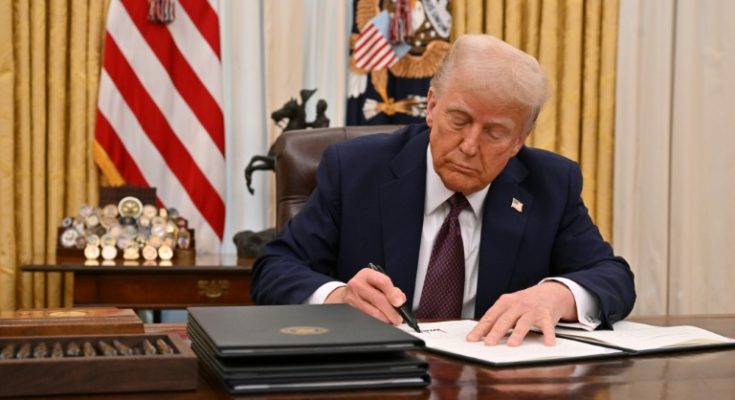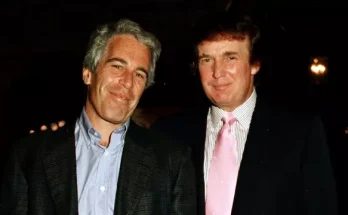President Donald Trump signed an executive order Thursday requiring the full release of aimed at fully releasing government documents related to the assassinations of former President John F. Kennedy, his brother and presidential candidate Robert F. Kennedy and civil rights icon Martin Luther King Jr.
The murder of President Kennedy on Nov. 22, 1963 has been the subject of intense speculation for decades, with rampant conspiracy theories and questions about what the government knows.
While millions of government records related to the Kennedy assassination have been released, some information remains classified and redacted. Trump’s order notes that the federal government also hasn’t released all information related to the other two assassinations.
“Their families and the American people deserve transparency and truth,” the order states. “It is in the national interest to finally release all records related to these assassinations without delay.”
Trump signed the order Thursday in the Oval Office, calling it “a big one.”
“A lot of people are waiting for this… for years, for decades,” Trump said, adding: “And everything will be revealed.”

The order requires the director of national intelligence and the attorney general to work with White House officials on a plan to release the John F. Kennedy records and present it to Trump within 15 days. A plan for releasing the other records must be presented to Trump within 45 days.
Trump’s order lays out the saga over releasing John F. Kennedy’s record. A law passed in 1992 required the records to be fully released by Oct. 26, 2017 unless the president at the time determines their release would cause “identifiable harm to the military defense, intelligence operations, law enforcement, or conduct of foreign relations… of such gravity that it outweighs the public interest in disclosure.”
Trump was president when the 2017 deadline arrived. He ordered the release of nearly 2,900 records, but kept others secret because of concerns by the CIA and FBI that their release could hurt national security.
“I previously accepted proposed redactions from executive departments and agencies … (agencies) in 2017 and 2018, but ordered the continued re-evaluation of those remaining redactions,” Trump’s executive order states, noting former President Joe Biden acted in 2021, 2022 and 2023 to give agencies more time to review the records.
“I have now determined that the continued redaction and withholding of information from records pertaining to the assassination of President John F. Kennedy is not consistent with the public interest and the release of these records is long overdue,” the executive order states.
The documents released in 2017 included details on the FBI and CIA investigations into Lee Harvey Oswald, the Marine veteran identified as Kennedy’s assassin, and information on covert Cold War operations.
In holding back some records, Trump said at the time: “I have no choice – today – but to accept those redactions rather than allow potentially irreversible harm to our nation’s security.”
The CIA had no immediate comment on Trump’s executive order.
But in the past, the spy agency has opposed wholesale release of the remaining documents on the grounds that it could compromise national security – specifically the top-secret sources and methods it uses to collect intelligence.
That includes human intelligence or “humint,” or how covert CIA officers personally get information, and “sigint,” or signals intelligences, which means what kinds of technologies are used to eavesdrop on targets overseas.
Then-CIA director William Burns described the agency’s position in a Dec. 15, 2021 letter to President Joe Biden about why some of information contained in the files about the 1963 assassination should never be redacted made public.
In it, Burns said “all information” in the CIA’s collection “about the assassination itself” had been released to the public.
“What remains redacted in the documents in this collection are not related to the assassination itself, but rather are primarily post-assassination documents and the details which remain classified concern intelligence sources and methods of current relevance,” Burns wrote.
Some of the files also contain information identifying CIA employees and their intelligence sources and assets. Release of that information, Burns said, could not only get them killed but undermine national security by giving away U.S. spying techniques and technologies for foreign adversaries.
“I am aware,” Burns told Biden, “of no public interest in disclosure that outweighs the serious and tangible harm to intelligence operations that will ensue from disclosure of such information.”
The FBI did not have any immediate comment.
Trump in a Fox News interview that aired Wednesday said Mike Pompeo, his former CIA director and secretary of state, and others discouraged him from releasing some of the Kennedy documents. Trump said Pompeo told him “it was just not a good time to release them.”
“They didn’t want the Kennedy stuff released and they’re professionals, and I respect them, and they’re working for me and the country, they’re working for the country,” Trump said. “And so I didn’t release but I’m going to release them immediately.”


